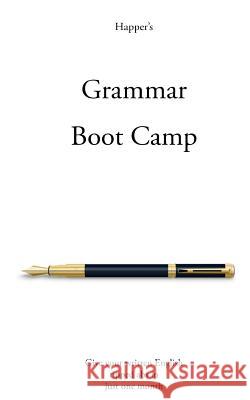Grammar Boot Camp: Give Your Written English Ripped ABS in Just One Month » książka
Grammar Boot Camp: Give Your Written English Ripped ABS in Just One Month
ISBN-13: 9780956242853 / Angielski / Miękka / 2014 / 136 str.
You can write beautiful English. I guarantee it. That or which? Where does the apostrophe go? What is an infinitive, and why do people get so wound up about splitting it? Oh man, not another grammar know-it-all banging on about petty rules that are only designed to trip me up and make him feel clever and that don't matter anyway and- Woah, dragon Even the experts don't agree on everything. But there are very widely accepted standards on most elements of writing, including how to write clear business English. On the one hand, it's good that we have these accepted ways of writing well. They can help you express yourself perfectly. That can be useful. Many employers use CVs with spelling mistakes as paper aeroplanes. These employers want to create a company that values quality. They know their customers care about details. So they want employees who can make a good impression and focus on the details. Because then they'll make lots of cash. On the other hand, many of these rules are bonkers. They hinder clear and graceful writing. The best writers have been ignoring them for centuries. For example, the whole split infinitives brouhaha grew from the notion that English should emulate Latin. That's a crackpot idea And why should the original meaning of a word be the only correct one? Sometimes, on closer examination, what many people assume is a never-to-be-broken rule is actually a question of style. It's not: are you right or are you wrong? It's: do you want to write informally or formally? Sadly, to some people even the bonkers rules are traps. If you don't spot them then they will pounce and tear you apart. Yeah, I hate those people too. I call them the Grammar Trappers. But if you spend a little time learning the tricks, then using them becomes second nature. 'Mirror, Signal, Manoeuvre' sounded baffling at first, but you don't even think about it when you get in the car now. It's like the old sign at the swimming pool: 'No running, no bombing, no petting...' If you follow those few simple guidelines, then the lifeguard won't throw you out. You can dive in and have some fun. It's the same thing with grammar. Get the rules in your head (or at your fingertips in a handy wee eBook) and the pool of language is yours. You can even do some petting if you know which corners to hide in... In my Grammar Boot Camp I run you through 31 of the most common grammar topics in written English. This book is short, but it covers 99 per cent of the Wobbles that Pooh and the rest of us have when writing. I give straightforward explanations and just enough technical stuff to help it all make sense. My examples are simple and clear. Occasionally I try to be amusing (forgive me). You can spend five minutes each day reading a tip and one month later you'll have the confidence to master any sentence. They are wrong. So wrong. This little guide tells you exactly how. So you can beat the Grammar Trapper know-it-alls at their own game. Why listen to me? I have been a professional writer for 18 years. As a copywriter I have created advertising for brands you see every day. My finely crafted phrases have enticed you to buy stuff you probably didn't need: whisky, Guinness, Pot Noodles, personal loans. Sorry about that. But I also write nice things like books about space, novels and children's fiction. This book began life as a series of daily emails that I sent round to all the staff of an advertising agency I worked in. People loved it. They requested more tips, added examples and, sometimes, corrected me. So I know for a fact that this course works. You really will get something out of it. Even if you remember one solitary tip you'll feel a little bit more confident when you next sit down to write. And if you remember a lot of things, then you'll feel positively empowered. English is your language as much as it is anyone else's. Here is where you take control of it. Who knows then what wondrous words will com











